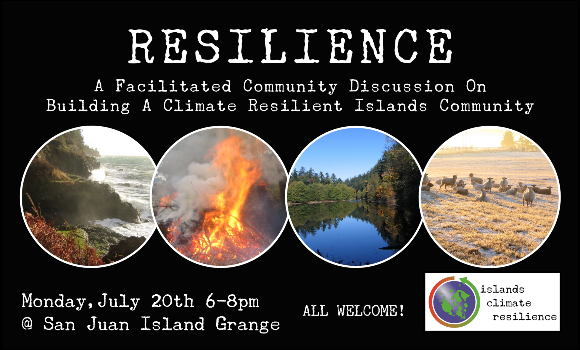Monday, July 20th, 6 to 8 p.m. at the San Juan Island Grange
— from the San Juan Conservation District —

County wide climate discussion, timed to take ferries back to Orcas, Shaw and Lopez Islands and to Anacortes
You are Invited to join a facilitated discussion on building a climate resilient San Juan Islands community.
The world is facing unprecedented change due to the impacts of climate change. Locally there are numerous projects, programs, and policies at play, which may or do partially address local and regional climate related impacts. To date there has not been a holistic assessment and analysis of our climate preparedness. The newly formed Islands Climate Resilience is hosting a facilitated Community Discussion to help us identify local climate change impact projections and local actions we can take to address, prepare and coordinate our efforts for climate related impacts in the San Juan Islands.
Join in the discussion to help create an islands community that is resilient to the impacts of climate change. We invite you to bring your insights and ideas.
Proposed Agenda for the evening:
- Overview & Introductions
- Presentation on general climate change impacts (from WA climate impacts assessment) to make sure everyone is on the same page and connect it to the reality in the San Juans – Why do we care?
- Examples of what other communities have done planning for climate related impacts and resilience.
- Breakout groups focusing on identified local climate issues such as water, fire, food, and health. Solution-oriented brainstorming discussion.
- Report from groups and discussion.
- Next steps and opportunities to stay involved.
Resources to help prepare for the community discussion:
- Climate Resiliency Toolkit for Community Planning https://toolkit.climate.gov/
- Washington State Integrated Climate Change Response Strategy https://www.ecy.wa.gov/climatechange/ipa_responsestrategy.htm
- University of Washington’s Climate Impacts Group (CIG) https://cses.washington.edu/cig/
**If you are reading theOrcasonian for free, thank your fellow islanders. If you would like to support theOrcasonian CLICK HERE to set your modestly-priced, voluntary subscription. Otherwise, no worries; we’re happy to share with you.**









HI fellow islanders,
I can’t believe taxpayers are paying someone with some sticky dots to lead a discussion on the weather. I offer the following at no charge ….
It is likely to get cold this winter. Get some long underwear, mittens and knit a wool hat. It will likely get warm next summer. Wear a hat, (not wool) get some sun screen and be smart enough to eat your lunch in the shade.
Consulting at no charge to the taxpayers.
Have a great day and with this kind of silly stuff coming down the pike, keep your sense of humor.
John Evans
Who provided the money for this event?
K. Jensen
Leadersʼ Declaration
G7 Summit
7-8 June 2015
From the G7 conference, page 12:
Climate Change
Urgent and concrete action is needed to address climate change, as set out in the IPCC’s Fifth Assessment Report. We affirm our strong determination to adopt at the Climate Change Conference in December in Paris this year (COP21) a protocol, another legal instrument or an agreed outcome with legal force under the United Nations Framework Convention on Climate Change (UNFCCC) applicable to all parties that is ambitious, robust, inclusive and reflects evolving national circumstances.
The agreement should enhance transparency and accountability including through binding rules at its core to track progress towards achieving targets, which should promote increased ambition over time. This should enable all countries to follow a low-carbon and resilient development pathway in line with the global goal to hold the increase in global average temperature below 2 °C.
Mindful of this goal and considering the latest IPCC results, we emphasize that deep cuts in global greenhouse gas emissions are required with a decarbonisation of the global economy over the course of this century. Accordingly, as a common vision for a global goal of greenhouse gas emissions reductions we support sharing with all parties to the UNFCCC the upper end of the latest IPCC recommendation of 40 to 70 % reductions by 2050 compared to 2010 recognizing that this challenge can only be met by a global response. We commit to doing our part to achieve a low-carbon global economy in the long-term including developing and deploying innovative technologies striving for a transformation of the energy sectors by 2050 and invite all countries to join us in this endeavor. To this end we also commit to develop long term national low-carbon strategies.
The G7 welcomes the announcement or proposal of post-2020 emission targets by all its members, as well as the submission of intended nationally determined contributions (INDC) and calls upon all countries to do so well in advance of COP21. We reaffirm our strong commitment to the Copenhagen Accord to mobilizing jointly USD 100 billion a year by 2020 from a wide variety of sources, both public and private in the context of meaningful mitigation actions and transparency on implementation.
Climate finance is already flowing at higher levels. We will continue our efforts to provide and mobilize increased finance, from public and private sources, and to demonstrate that we and others are well on our way to meet the USD 100 bn goal and that we stand ready to engage proactively in the negotiations of the finance provisions of the Paris outcome. We recognize the potential of multilateral development banks (MDBs) in delivering climate finance and helping countries transition to low carbon economies. We call on MDBs to use to the fullest extent possible their balance sheets and their capacity to mobilize other partners in support of country-led programs to meet this goal. We thank the presidency for the publication of the Background Report on Long-Term Climate Finance and call for a further exchange in all relevant fora in view of COP 21.
Mobilization of private sector capital is also crucial for achieving this commitment and unlocking the required investments in low-carbon technologies as well as in
building resilience against the effects of climate change. To overcome existing investment barriers finance models with high mobilization effects are needed.
To this end, we will:
a) Intensify our support particularly for vulnerable countries’ own efforts to manage climate change related disaster risk and to build resilience. We will aim to increase by up to 400 million the number of people in the most vulnerable developing countries who have access to direct or indirect insurance coverage against the negative impact of climate change related hazards by 2020 and support the development of early warning systems in the most vulnerable countries. To do so we will learn from and build on already existing risk insurance facilities such as the African Risk Capacity, the Caribbean Catastrophe Risk Insurance Facility and other efforts to develop insurance solutions and markets in vulnerable regions, including in small islands developing states, Africa, Asia and Pacific, Latin America and the Caribbean as set out in the annex.
b) Accelerate access to renewable energy in Africa and developing countries in other regions with a view to reducing energy poverty and mobilizing substantial financial resources from private investors, development finance institutions and multilateral development banks by 2020 building on existing work and initiatives, including by the Global Innovation Lab for Climate Finance as set out in the annex.
We also reaffirm our ambition to make the Green Climate Fund fully operational in 2015 and a key institution of the future climate finance architecture.
We remain committed to the elimination of inefficient fossil fuel subsidies and encourage all countries to follow and we remain committed to continued progress in the OECD discussions on how export credits can contribute to our common goal to address climate change.
We pledge to incorporate climate mitigation and resilience considerations into our development assistance and investment decisions. We will continue our efforts to phase down hydrofluorocarbons (HFCs) and call on all Parties to the Montreal Protocol to negotiate an amendment this year to phase down HFCs and on donors to assist developing countries in its implementation.
In order to incentivize investments towards low-carbon growth opportunities we commit to the long-term objective of applying effective policies and actions throughout the global economy, including carbon market-based and regulatory instruments and call on other countries to join us. We are committed to establishing a platform for a strategic dialogue on these issues based on voluntary participation and in cooperation with relevant partners, including the World Bank.